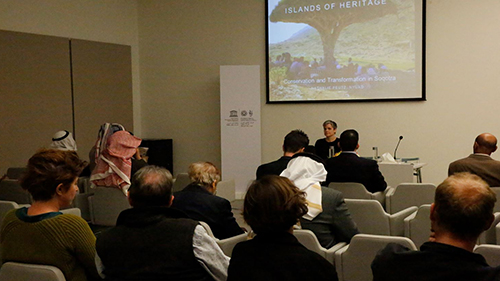Contact Center
.
10 March 2019
Lecture at the Arab Regional Centre for World Heritage on Dr. Nathalie Peutz sheds lights on Yemen’s Soqotra natural and cultural heritage


Dr. Nathalie Peutz, Program Head of Arab Crossroads Studies and Assistant Professor of Arab Crossroads Studies, NYUAD, gave a lecture on Sunday, 10 March 2019 at the Arab Regional Centre for World Heritage in Manama. Dr. Peutz discussed during her presentation the efforts made to safeguard and preserve the natural and cultural heritage in the Yemeni archipelago, Soqotra, a UNESCO natural World Heritage Site, as illustrated in her new book entitled “Islands of Heritage: Conservation and Transformation in Yemen.
Dr. Nathalie Peutz thanked the Arab Regional Centre for World Heritage’s management team for hosting this lecture, for its efforts to safeguard Soqotra archipelago and supporting the local community, which continues to preserve its cultural and natural heritage.
Dr. Peutz said that despite the country's political challenges, Soqotora’s infrastructure witnessed a major development in the 1990s, bringing up new roads network and increasing tourists’ ability to visit and discover its beauty an richness. Following the increasing of researchers and tourists desiring to visit the archipelago, the Yemeni government drafted many laws and regulations with a goal to coordinate all government donor efforts towards sustainable human development for the people of the Socotra Archipelago, while conserving the globally significant biodiversity of these unique islands. The efforts of EPA/SCDP in managing the development and conservation of the islands was vital for the archipelago’s continued integrity, and for the preservation of this unique part of humankind’s natural heritage. An important constitutional amendment was also ratified in the year 2001, which states that : “The protection of the environment is the
responsibility of the state and society, and it is a national and religious obligation of every citizen.” In addition, other laws were passed, such as the Executive Regulation of the Environment Protection Law of 2001, Socotra Conservation and Development Programme (SCDP), 2004, to safeguard and preserve the natural and cultural heritage of the archipelago. These efforts and projects gave their fruits, resulting in 2008 when Soqotora was inscribed on UNESCO World Heritage List Site, Dr. Peutz added.
Dr. Peutz also said that Yemeni island of Socotra, given the increasing world attention and interest in its natural heritage, is forging its own future, and how this thriving community taking control of its heritage and destiny. Dr. Peutz explored the ways the people of Socotra have responded to the increasing influence of outside forces on their island, arguing that the Islands of ¬Heritage is less about the animals and plants that make Socotra unique and more about the impact of conservation efforts on the islanders; it is about language and culture and what happens to these when an island experiences rapid and radical change.
Dr. Peutz added that the “People are worried about cultural loss, language loss and how to retain what it is that makes them distinctive.” As Peutz writes: “This international and state focus on Socotra’s natural heritage generated a concerted interest among Soqotrans in their cultural heritage: a heritage they could better define and control – and thus profit from … For at the same time that Socotra was gaining prominence nationally and internationally, it seemed to be losing – according to its emigrants, at least – more and more of its distinctive identity, culture and traditions.” Dr. Peutz added that the archipelago is also characterized by a unique cultural heritage: the Soqotri people speak a unique non-written pre-Islamic language of ancient origin, and their cultural traditions host a wealth of traditional knowledge on the sustainable use of natural resources and biodiversity. The documentation and conservation of these cultural values are recognized as vital to the preservation of the delicate balance between nature and human livelihoods in the archipelago.
Worth to mention that Dr. Nathalie Peutz is an anthropologist and Assistant Professor of Arab Crossroads Studies at New York University Abu Dhabi. Her research focuses on forced migration, displacement and immobility, conservation and development, and identity and heritage in the Arab world and the Western Indian Ocean region. Her publications include Islands of Heritage: Conservation and Transformation in Yemen (Stanford University Press, 2018); a co-edited volume, The Deportation Regime: Sovereignty, Space, and the Freedom of Movement (with Nicholas De Genova, Duke University Press, 2010); and several articles on the transformation of Yemen’s Soqotra Archipelago into a World Heritage Site. She has received fellowships and grants from the Princeton Institute for Advanced Studies, the Bellagio Rockefeller Foundation, the Council of Middle East Studies at Yale University, the American Institute for Yemeni Studies, Fulbright-Hays (DDRA), the Social Science Research Council (IPFP), the Center for Arabic Study Abroad (CASA), and the Andrew F. Mellon Foundation. She is currently working on a second book project titled Gate of Tears: Migration and Impasse in Yemen and the Horn of Africa based on her ethnographic fieldwork with Yemeni migrant and refugee communities in the Horn of Africa.







